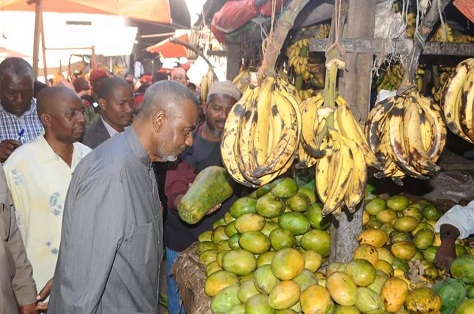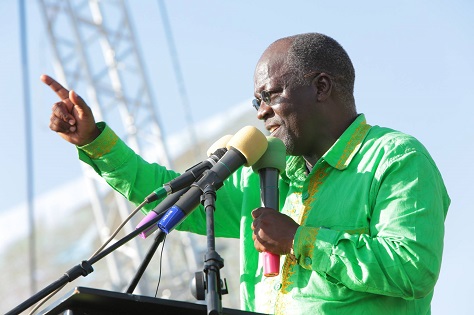Though it was the most competitive presidential election in the history of democratic Tanzania, the ruling party candidate, public works minister John Magufuli easily won the election last Sunday in results announced earlier today by Tanzania’s elections commission.![]()
![]()
Magufuli emerged as a dark-horse candidate of the ruling Chama Cha Mapinduzi (CCM, Party of the Revolution) after a contentious fight left former prime minister Edward Lowassa and foreign minister Bernard Membe (the favorite of outgoing president Jakaya Kikwete) both precluded from contention.
Earlier this summer, the spurned Lowassa decided instead to depart for the opposition camp, becoming the presidential challenger for a coalition that includes Chama Cha Demokrasia na Maendeleo (popularly known simply as Chadema), a liberal opposition party formed in 1992.
Tanzania’s electoral commission announced that Magufuli won 58.46% of the vote while Lowassa won just 39.97%. The CCF is also expected to win a majority of the 357 seats in Tanzania’s Bunge, the unicameral parliament.
* * * * *
RELATED: Genuinely competitive election boosts Tanzanian democracy
* * * * *
Lowassa, who served as Kikwete’s prime minister from 2005 to 2008, left office in scandal and mired under allegations of corruption. While his political power and support base made him the most potent possible challenger for Chadema, it also tarred the previously anti-corruption opposition party. No longer would Chadema necessarily be the party of change nor would it be the party of transparency and good government, and its 2010 presidential candidate Wilbrod Slaa left the party and endorsed Magufuli.
Magufuli, age 55, swatted away criticisms of old age and ill health, at one point doing push-ups on the campaign trail to demonstrate his vigor. The showdown between him and Lowassa was among the most contested election campaigns in the country’s history, with both candidates vying for an electorate that’s one of the world’s youngest — 50% of the population is between the ages of 18 and 32.
But as easily as the national elections seem to have gone throughout the Tanzanian mainland, the islands of largely autonomous Zanzibar have been far more problematic.
Zanzibar is an Indian Ocean archipelago that sits just off the mainland coast, though it consists chiefly of two major islands, Unguja (home to the capital, Zanzibar City and the historic center, Stone Town) and Pemba. Notorious as a hub of the spice trade, Zanzibar today is more renowned for its tourism. The islands reverted from a British protectorate to a sultanite in 1963, but a left-wing revolt a year later deposed the sultan (who still lives in the United Kingdom today).
After the bloody revolt, Zanzibar joined into a union later in 1964 with the mainland, then known as Tanganyika (also a former British protectorate and previously German East Africa) to form the republic of Tanzania. Almost exclusively Muslim, Zanzibar has traditionally enjoyed a large degree of autonomy, including its own president and parliament. Functionally, however, the CCM’s control over both the Tanzanian and Zanzibari governments has limited the practical scope of that autonomy over the past 50 years. Though it’s home to just 1.3 million people (out of a wider Tanzanian population of nearly 51 million), it’s culturally quite distinct from the mainland.
Despite the tight contest in Tanzania, Zanzibar’s presidential contest was always expected to come down to a photo finish.

Chama Cha Wananchi (CUF, Civic United Front), the Zanzibar-based opposition party, came narrowly close to winning the Zanzibari presidency in the last election in 2010 and its candidate, Seif Sharif Hamad, officially won 49.1% against the CCM’s Ali Mohamed Shein, who won 50.1%. At the time, Shein argued that the ruling party prevailed only as a result of fraud, and he made a plausible case. Unlike on the mainland, the CUF has long been a real threat, and the 2000 elections led to outright violence.
Given a remarkable amount of autonomy in 1964, Zanzibar elects its own president and parliament, and those elections also take place on Sunday. Given the CCM’s political hegemony, however, Zanzibar’s autonomy has never really been tested by adverse governments. Culturally, Zanzibar is more like Kenya’s Somali coast or Mombasa than the rest of Tanzania. Unlike the mainland, where both Christianity and Islam are both predominant, Zanzibar is almost entirely Muslim.
Hamad declared victory on Tuesday before any official results had been announced, accusing the ruling party of delaying the results as part of a fraudulent scheme, even while police forces used tear gas to disburse his supporters. A day later, however, the electoral commission nullified the election, alleging that the voting had not been free and fair. While outright nullification is unprecedented, there’s no indication of when (or whether) voters will have a new chance to vote for a local government, and Shein’s current term ends on November 2.

